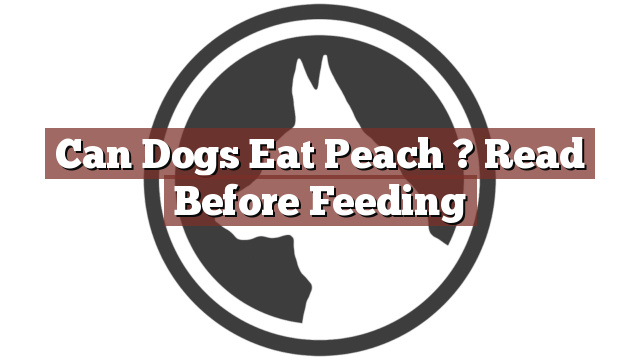Understanding Your Dog’s Dietary Needs
As a responsible pet owner, it is essential to be aware of what foods are safe and healthy for your furry friend. Understanding your dog’s dietary needs is crucial to ensure their overall well-being. While dogs are primarily carnivorous, their bodies can also benefit from some fruits and vegetables. However, it is essential to note that not all fruits and vegetables are safe for dogs to consume. One fruit that often raises questions is the peach. So, can dogs eat peaches?
Can Dogs Eat Peaches? Read Before Feeding
Can dogs eat peaches? The answer is yes, but with caution. Peaches can be a tasty and nutritious treat for your dog, but there are a few things to consider before feeding them this fruit. Peaches contain essential vitamins such as vitamin A and vitamin C, which can support your dog’s immune system and contribute to their overall health. However, it is crucial to remove the peach pit, as it contains cyanide, which is toxic to dogs. The pit can pose a choking hazard and may even cause intestinal blockages. Additionally, the peach skin can be difficult for dogs to digest, so it is recommended to peel the peach before feeding it to your furry companion.
Pros and Cons of Feeding Peaches to Your Dog
Feeding peaches to your dog can have both pros and cons. On the positive side, peaches are a great source of dietary fiber, which can aid in digestion and promote a healthy bowel movement. They also contain antioxidants that can help reduce inflammation and protect against certain diseases. Furthermore, peaches are low in calories and fat, making them a suitable option for dogs on a weight management plan.
However, it is important to note that while peaches are safe for dogs in moderation, excessive consumption can lead to gastrointestinal upset. Some dogs may have a sensitive stomach, and introducing new foods, like peaches, too quickly or in large quantities, can cause diarrhea or vomiting. Therefore, it is advisable to start with small amounts and monitor your dog’s reaction before adding peaches to their regular diet.
Conclusion: Considerations for Feeding Peaches to Your Dog
In conclusion, peaches can be a healthy and enjoyable treat for your dog when fed in moderation. However, it is vital to take certain precautions to ensure your dog’s safety and well-being. Always remove the peach pit and peel the skin before offering this fruit to your furry friend. Furthermore, monitor your dog for any signs of digestive distress or allergies when introducing peaches or any new food into their diet. If you notice any adverse reactions, consult your veterinarian for guidance.
Remember, while peaches can provide some health benefits, they should never replace a balanced and complete dog food diet. Consult with your veterinarian about the specific dietary needs of your dog to ensure they are receiving the proper nutrition for optimal health. By being mindful of what you feed your dog, you can enhance their overall well-being and provide them with a long and happy life.
Thank you for taking the time to read through our exploration of [page_title]. As every dog lover knows, our furry friends have unique dietary needs and responses, often varying from one canine to another. This is why it's paramount to approach any changes in their diet with caution and knowledge.
Before introducing any new treats or making alterations to your dog's diet based on our insights, it's crucial to consult with a veterinarian about [page_title]. Their expertise ensures that the choices you make are well-suited to your particular pet's health and well-being.
Even seemingly harmless foods can sometimes lead to allergic reactions or digestive issues, which is why monitoring your dog after introducing any new food item is essential.
The content provided here on [page_title] is crafted with care, thorough research, and a genuine love for dogs. Nevertheless, it serves as a general guideline and should not be considered a substitute for professional veterinary advice.
Always prioritize the expert insights of your veterinarian, and remember that the health and happiness of your furry companion come first.
May your journey with your pet continue to be filled with joy, love, and safe culinary adventures. Happy reading, and even happier snacking for your canine friend!

